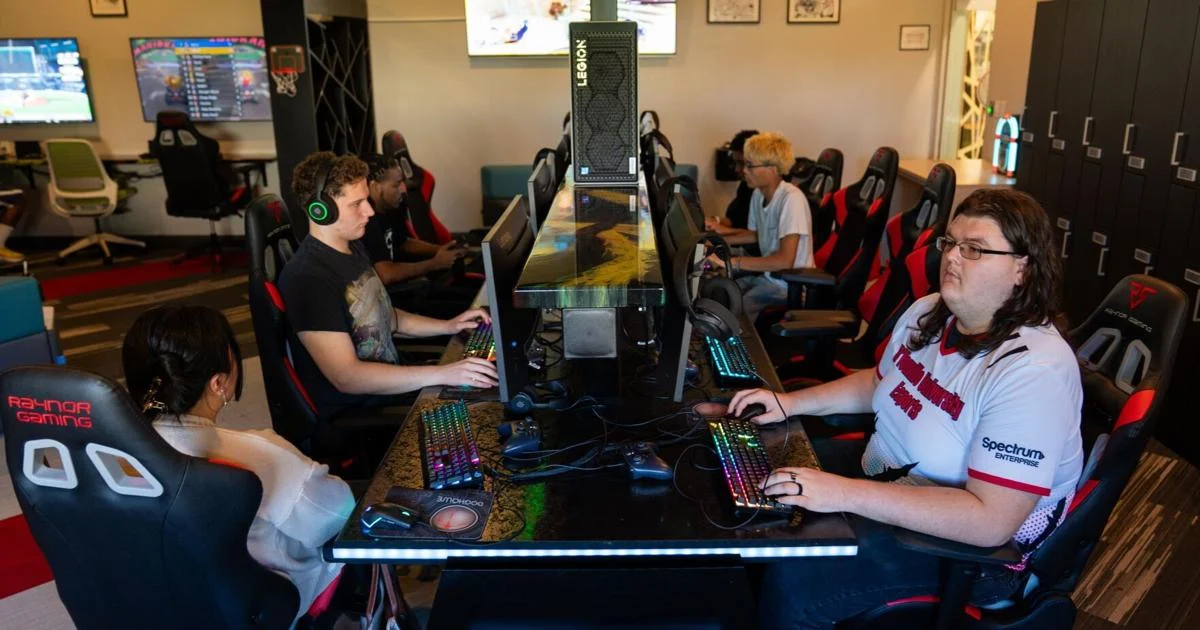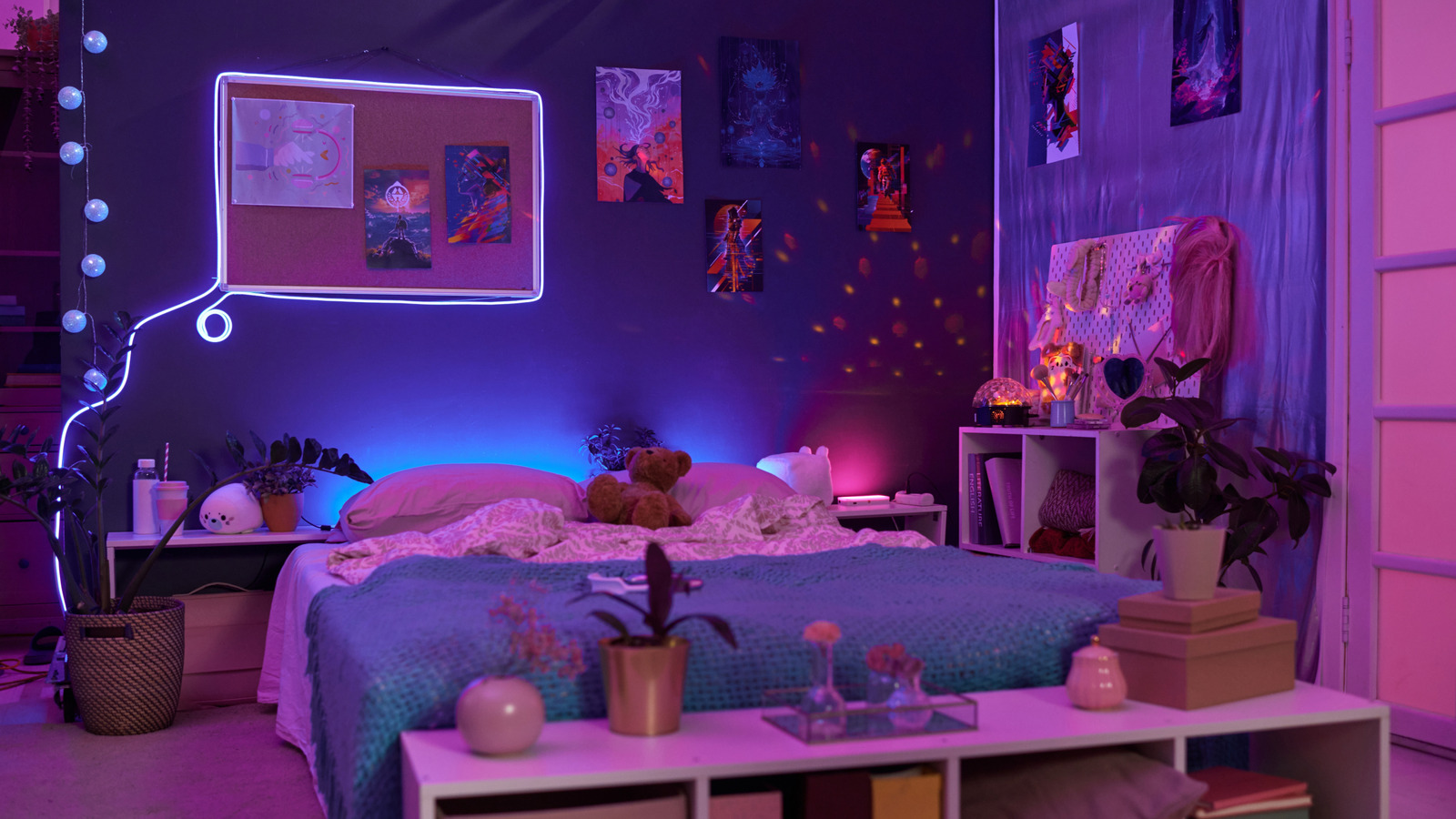
Shortly before the pandemic hit, several students came to faculty members at D’Youville University asking if they could play in a local gaming tournament under the school’s name.
D’Youville had already begun adding more sports programs as it transitioned from Division III to II athletics, so school officials figured why not enter the realm of esports as well.
What began as a handful of players representing D’Youville when the college officially began competing five years ago has grown to 22 varsity players and sometimes more than 40 participating at the club level.
The varsity program has been buoyed by D’Youville investing about $125,000 to build an esports arena inside a former classroom in Saints Center where students can compete or simply play for fun.
“We looked at the space and thought, ‘maybe this is a good place for esports,’” said Mark Alicea, a former esports player who now serves as D’Youville’s head coach, as well as manager of instructional technology. “It was just a classroom where we had a few classes, but as we developed the entire building as athletic space, this became a great fit.”
Colleges are embracing young people’s love for video games. For some, that’s meant bringing esports to their campus.
Local schools have invested hundreds of thousands of dollars to start varsity and club teams and turn antiquated spaces into esports arenas equipped with broadcasting, surround sound and streaming capabilities and high-end gaming PCs and consoles.
Some are even adding programming and classes to appeal to gaming creation and design enthusiasts.
Local colleges like the University at Buffalo, St. Bonaventure, Villa Maria, Buffalo State, Niagara County Community College, Canisius and Daemen are now among the ranks of hundreds of schools competing in esports.
“As soon as we decided to put it out there and listed esports as a potential interest area, it took off,” said Dean Whitcomb, St. Bonaventure’s director of undergraduate admissions, who’s been with the enrollment team for over a decade. “The amount of people who listed that they’d be interested in participating is noticeable. It’s absolutely an enrollment driver.”
It’s a way to help recruit and retain more students during a difficult time for colleges to build enrollment. Schools are offering scholarships to students playing varsity and it’s created added appeal for those who simply enjoy gaming recreationally. There’s also tournament prize money at stake that can go toward students’ tuition and expenses.
It’s also helped students looking for an outlet for their mental health, while bringing students from all different backgrounds and majors together, building camaraderie and friendships.
“It builds that team bonding that I feel like you can’t always get in a traditional classroom,” said Sebastian Muzyka, a marketing major, who’s the captain for the Overwatch team at D’Youville. “Just working together as a team to get over a hardship is exciting and makes me want to keep coming back.”
Colleges are trying to connect with students in different ways and provide them with something above and beyond what they expect.
“It’s where the students’ interests are,” said Brian Emerson, executive vice president, Title IX coordinator and corporate compliance and enrollment officer at Villa Maria. “They play all the time, and this is what they expect to do. We want to capitalize on that to give them a great experience.”
It’s helping break stereotypes and stigmas about gaming, according to James Basta, who’s running the esports program at UB.
“UB is pumping money into esports because it is something that brings students together and brings them joy, especially in the post-Covid world where people are more likely to stick to themselves,” Basta said. “We’re creating these spaces where students can come and be together doing something that’s traditionally more of an isolating thing.”
More than 220 people are involved in either varsity, club or intramural teams at UB. The teams are playing games like League of Legends, Valorant, Overwatch 2 and Rocket League, competing in the Esports Collegiate Conference, which is operated by the NCAA’s Mid-American Conference.
To support all that interest, UB opened its high-tech Level Up space in 2022 on the second floor of Lockwood Memorial Library on the North Campus in what used to be a computer area. There’s also the Red Jacket Lounge space, which was finished in 2023 and is one of the biggest gaming labs in a dorm area in the country.
“The reason this is going so well at UB is that we’re not simply focusing on the competitive part of it,” Basta said. “Some schools recruit a few different teams but then they exist in a vacuum. Here, if you’re a gamer, people will point you to Level Up.”
St. Bonaventure invested over $500,000 into its Level Up Game Room, which opened in March as a gaming setup for competition teams and general student play in what was formerly a student recreation room.
“It’s been a game changer. The amount of student traction we have received as a result of our new facility is astonishing,” said Christian Greer, St. Bonaventure’s esports head coach since 2022.
Whitcomb said St. Bonaventure has found that esports is one of the fastest growing student interests for the university. It attracts around 15 new scholarship varsity players and at least 15 club players each year.
“We talked about if we’re going to do it, we’ve got to do it right,” Whitcomb said. “We feel like it’s something that’s already paying off for us.”
D’Youville treats its esports athletes like any other scholarship player on a team. They must adhere to academic standards and meet with nutritionists and mental health counselors.
“For someone who’s been playing games their whole life and sometimes playing them to help me cope, this is amazing,” said Mekhi Irvy, an exercise sports studies major who’s a player on the Overwatch team at D’Youville. “Sometimes you need that break in your life. When you’re stressed out, you can come here, play some games and now your mind is clear.”
Recruiting tool for schoolsColleges don’t just bring students interested in esports through their arenas, they try to show the space to just about every student visiting the school.
MD Islam of the Bronx, who’s in his third varsity year playing League of Legends, learned about UB’s esports program while touring the campus.
For UB, it’s a little bit more about retention and giving students who come to the school more of a reason to stay. UB does not offer scholarships to its varsity players but tries to support them in other ways through providing high-level coaching, uniforms and travel.
“When I heard UB had a really competitive varsity team, I was interested in playing,” he said. “My freshman year, I got in, and it’s been fun ever since.”
Western New York is playing a bit of catch-up in the esports realm and local colleges are trying to help fill that gap.
Alicea has been reaching out to local K-12 school districts to help build a platform for schools to get their feet wet in competitive play. Additionally, he’s hosted parks and recreation departments from municipalities to help them build an esports platform.
“It gives all of us a bigger recruiting pool to pick from,” Alicea said.
Gaming concentrations catching on Villa, which has about 25 players on its varsity esports teams, took the next step and created a game design program for gaming enthusiasts.
The college launched the program after weighing the viability of game design as a career track, market demand and whether there’s interest from students.
“It just sort of fits with the student personality profile,” Emerson said. “It’s an investment we’re making in the student experience.”
Villa offered the first classes toward a game design degree in 2023, and it already has 50 students in the program, making it one of the college’s largest areas of study. The school has invested heavily in equipment for a game design computer lab and digital media arts center, opened in the college’s former library and bookstore.
Eddie Mas, Villa’s head esports coach, said Villa hosts game design workshops and networking programs with professionals there for high schoolers and BOCES students.
Schools like D’Youville and St. Bonaventure are considering getting esports into their curriculum to match with degree areas like sports management and broadcasting.
But officials from some schools aren’t diving in too quickly, realizing esports is an increasingly competitive world to get into.
“Everyone wants to work in the world that they enjoy and make their passion, their career,” Basta said. “I try to tell students to enjoy the competition aspect of it but then also focus on what your career is going to be in. Sometimes it’s better to take the path of less resistance.”
Want to see more like this?
Get our local education coverage delivered directly to your inbox.
* I understand and agree that registration on or use of this site constitutes agreement to its user agreement and privacy policy.
Michael Petro
Reporter
Get email notifications on {{subject}} daily!
Your notification has been saved.
There was a problem saving your notification.
{{description}}
Email notifications are only sent once a day, and only if there are new matching items.
Followed notifications
Please log in to use this feature
Log In
Don’t have an account? Sign Up Today



